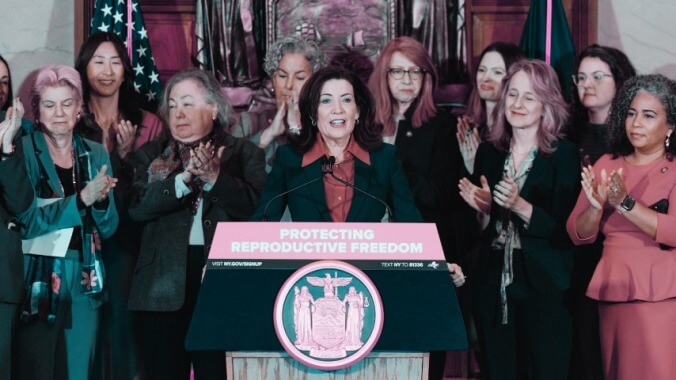Louisiana, Texas Escalate Their War on New York Abortion Provider
“We haven’t seen this kind of disparity in state laws around human rights since the Civil War," one legal expert told Jezebel. "What constitutes a human right in one state is a capital crime in another."
Photo: Screenshot AbortionIn DepthPolitics
In December, Texas filed a lawsuit against New York’s Dr. Margaret Carpenter for allegedly mailing abortion pills to a Dallas woman. A month later, a Louisiana jury indicted Carpenter for allegedly mailing abortion pills to a Louisiana woman, who gave the pills to her teenage daughter; the felony charge against Carpenter comes with the threat of five years in prison. As of this week, there are some chilling new developments in both cases: On Wednesday, Louisiana Gov. Jeff Landry and state Attorney General Liz Murrill, both Republicans, signed an extradition warrant for Carpenter to be brought to Louisiana to stand trial. And a Texas judge ordered Carpenter to pay a penalty of more than $100,000 in the civil case brought forth by state Attorney General Ken Paxton (R).
However, shield laws currently protect Carptner, and New York Gov. Kathy Hochul (D) has been unequivocal in refusing to extradite her. “Louisiana has changed their laws, but that has no bearing on the laws here in the state of New York,” Hochul told reporters on Thursday. “Doctors take an oath to protect their patients. I took an oath of office to protect all New Yorkers, and I will uphold not only our constitution, but also the laws of our land. And I will not be signing an extradition order that came from the governor of Louisiana. Not now, not ever.”
Louisiana enforces a total abortion ban punishable with up to 15 years in prison; it also passed the first law in the nation that criminalizes possession of abortion pills in most cases. But New York is one of several states to enforce shield laws, which protect health care workers from legal threats for providing abortion care to patients from states that ban abortion—including via mailing pills across state lines. New York’s shield law also protects Carpenter from the $100,000 penalty coming from Texas. But the entire point of both of these actions—the criminal charge from Louisiana and the civil suit from Texas—is to challenge shield laws, testing their limits and prompting a series of court battles that could wind up at the Supreme Court.
Doctors take an oath to protect their patients.
I took an oath to protect all New Yorkers.
So let me be clear: I will not sign Louisiana’s extradition order — not now, not ever. pic.twitter.com/3Ly9xcMiza
— Governor Kathy Hochul (@GovKathyHochul) February 13, 2025
“Dr. Carpenter needs to be careful with her travel plans,” Murrill posted on social media last Friday. In a statement to the Louisiana Illuminator this week, Murrill suggested Carpenter could face arrest if she sets foot in a GOP-led state: “New York officials, including the governor, are not at liberty to ignore interstate compacts and laws regarding extradition. The doctor could be arrested in other places. If New York won’t cooperate, there are other states that will.” Of course, it’s not that simple.
Attorney Alejandra Caraballo, co-author of the 2023 CUNY law review article Extradition in Post-Roe America, told Jezebel that what’s likely to come next is fairly thorny—and she expects these challenges to New York’s shield law to wind up at the Supreme Court. In Texas’ civil case, she anticipates the state will seek enforcement in New York state court; states are typically required to follow other states’ court orders—but New York’s shield law explicitly bars this, which could lead to a showdown in federal court, possibly winding up at SCOTUS. As for Louisiana’s case, the state is expected to ask a federal court to order extradition, which is also likely to trigger a court battle that could work its way up to the high court. But Caraballo stressed that Louisiana’s extradition case is complicated by the fact that Carpenter doesn’t meet the definition of a “fugitive,” because she didn’t travel to Louisiana, commit a crime, then flee.
-

-

-

-

-

-

-

-

-

-

-

-

-

-

-

-

-

-

-

-

-

-

-

-

-

-

-

-

-

-

-

-

-

-

-

-

-

-

-

-








































